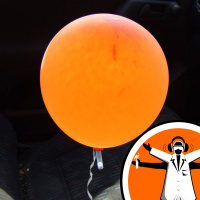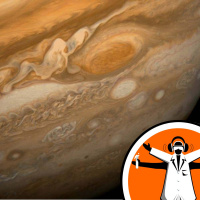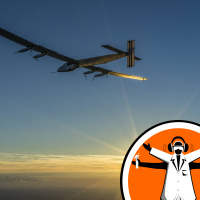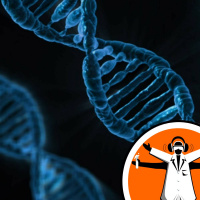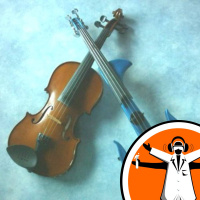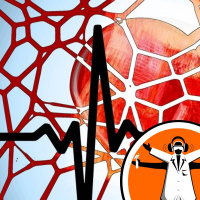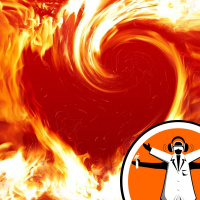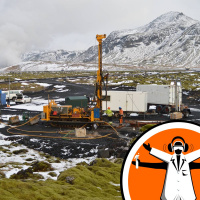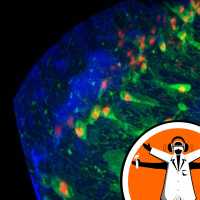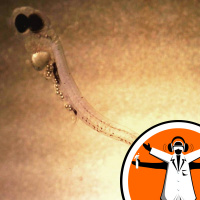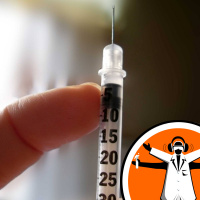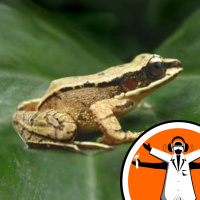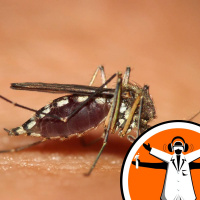Synopsis
Probing the weird, wacky and spectacular, the Naked Scientists Special Editions are special one-off scientific reports, investigations and interviews on cutting-edge topics by the Naked Scientists team.
Episodes
-
Getting every last drop
06/07/2016 Duration: 03minDays of squeezing the last drop from your shampoo bottles are over! Thanks to researchers from the US, we now have a material which allows sticky liquids to flow freely AND this has big implications for recycling, as Philip Brown explained to Lucka Bibic... Like this podcast? Please help us by supporting the Naked Scientists
-
Life-saving helium discovery
05/07/2016 Duration: 03minHelium is the stuff that goes into party balloons and is also an essential ingredient in hospital MRI scanners. Most people have heard of helium but not many realise that we're in danger of running out of it. Luckily, Jon Gluyas from Durham University, has come up with a new way of finding it. Claire Armstrong spoke to him to hear how... Like this podcast? Please help us by supporting the Naked Scientists
-
Juno probe plunges into Jupiter
04/07/2016 Duration: 04minToday, NASA's Juno spacecraft has plunged into uncharted territory, flying closer to Jupiter than we've ever been before. Graihagh Jackson spoke to co-investigator of the Mission, Professor Stan Cowley from Leceister University... Like this podcast? Please help us by supporting the Naked Scientists
-
Two Zika vaccine candidates discovered
03/07/2016 Duration: 04minBack in February the World Health Organisation declared the zika virus epidemic in Brazil to be a public health emergency of international concern. At the top of the list was the link between Zika infection and babies being born with microcephaly or an abnormally small head. Now scientists in the US have taken the first steps towards developing a much-needed vaccine, which they've so far tested successfully on mice. Dan Barouch from Harvard University spoke to Chris Smith... Like this podcast? Please help us by supporting the Naked Scientists
-
Solar powered jet makes historic crossing
29/06/2016 Duration: 05minSolar Impulse is a unique plane, powered not by jet fuel, but solar energy and it is currently on a record-breaking tour around the world. But how does that plane work and what is it like to fly? What happens when the sun begins to fade and the nigh falls over the ocean? Can a solar plane keep flying? Lucka Bibic caught up with co-pilot Andre Borschberg to ask about his green aviation mission. Like this podcast? Please help us by supporting the Naked Scientists
-
Mini-guts for testing cystic fibrosis theraphy
29/06/2016 Duration: 05minCells collected from the intestines of patients with the disease cystic fibrosis can be grown in the laboratory dish to produce balls of cells that scientists are calling mini guts. These can be used to test a series of new cystic fibrosis drugs that are now entering the clinic. But because these agents don't work on everyone, finding out who will benefit can mean a laborious trial for the patient. Mini guts on the other hand take just a few weeks to grow and give results in just days or hours. Jeffrey Beekman, from the Wilhelmina Children's Hospital, Utrecht, invented the technique... Like this podcast? Please help us by supporting the Naked Scientists
-
Silky sounds - making violins from silk
29/06/2016 Duration: 05minWhen it comes to making musical instruments, there's as much science in today's violins as there is art. While many manufacturers around the world are still creating wooden violins, others are turning to alternative materials such as carbon fibre. But, as Kat Arney discovered, the natural world may provide even more options for making instruments with exciting new sound properties. Like this podcast? Please help us by supporting the Naked Scientists
-
Iron Up Against Heart Failure
21/06/2016 Duration: 05minChronic Heart Failure is the inability of your heart to effectively pump blood around your body and affects over half a million people in the UK alone. So what causes it and could treatments lie in something as simple as iron? Doctor Paul Kalra is a cardiologist from Portsmouth Hospital and he gave Chris Smith the lowdown. Like this podcast? Please help us by supporting the Naked Scientists
-
Sudden cardiac death in the young
15/06/2016 Duration: 06minSudden cardiac death in the young, that's an apparently healthy person dying unexpectedly from heart-related issues under the age of 35, is rare but devastating. It is also something of a mystery to many scientists. So how can we try to prevent young people from dying unexpectedly like this? Could genetic screening be the answer? Georgia Mills caught up with Michael Ackerman, from the Mayo Clinic in Minnesota, at the British Cardiovascular Society Conference 2016. Like this podcast? Please help us by supporting the Naked Scientists
-
Turning Carbon Dioxide Into Stone
10/06/2016 Duration: 03minCarbon dioxide is a problematic greenhouse gas contributing to global warming. Power plants are major emitters of carbon dioxide, but unfortunately, current methods of capturing and storing excess carbon dioxide have not been very effective. Only a small amount of carbon dioxide actually gets stored permanently. But researchers at Columbia University have demonstrated that their unique carbon capture and storage process can actually convert carbon dioxide into environmentally friendly limestone in less than two years. Fanny Yuen spoke with Dr. Juerg Matter to hear more about his pilot study. Like this podcast? Please help us by supporting the Naked Scientists
-
The Longest Tunnel Ever Built
07/06/2016 Duration: 04minOn June the 1st, Switzerland announced the opening of the world's longest tunnel. Called the Gotthard tunnel, it runs under the Alps to link Northern and Southern Europe; and at 57.5 km, it's fair to say, you certainly wouldn't be able to see the light at the end of it! Our resident technology expert Peter Cowley talked Connie Orbach through the project. Like this podcast? Please help us by supporting the Naked Scientists
-
Immune System Surprisingly Adaptive
06/06/2016 Duration: 04minImmune cells are essential to the maintenance and repair in our bodies. However, an over-active immune system can lead to diseases such as arthritis, chronically inflamed wounds and atherosclerosis. Therefore, it is imperative to understand and carefully control our immune system activity. Our innate or non-specific immune system, acts as our body's first line of defence, these cells quickly reach the site, form a barrier, remove foreign material, and activate our more sophisticated adaptive immune system. Until now these non-specific immune cells were believed to have no memory and act in a... Like this podcast? Please help us by supporting the Naked Scientists
-
Fish Prefer Pastic Over Food
06/06/2016 Duration: 03minEarlier this year, the US banned microparticle beads from personal care products, but Europe has yet to follow suit. Now, researchers from Uppsala University are increasing the urgency as for the first time, they have been able to show that fish actually prefer to eat microplastic particles rather than their own food of zooplankton, causing disastrous effects to their survival. Fanny Yuen and spoke with Dr. Oona Lnnstedt to better understand the issue. Like this podcast? Please help us by supporting the Naked Scientists
-
Universal Cancer Vaccine
05/06/2016 Duration: 04minA vaccine that can teach the immune system to attack any type of cancer is being developed and tested by scientists in Germany. Cancer affects one person in every three. It's caused by genetic damage to our cells, which leads them to grow in an uncontrolled and invasive way. But because the cancer cells are part of our own body, the immune system normally ignores them because they're regarded as non-hostile. What Ugur Sahin and his colleagues are doing is to identify a series of chemical markers that are unique to a patient's cancer cells and then turn these into a genetic message that is... Like this podcast? Please help us by supporting the Naked Scientists
-
Does salt increase blood pressure?
26/05/2016 Duration: 09minAs a nation, the UK are above the intake guidelines for salt, which, for an adult, is 6g per day. To put that into perspective, there's about half a gram in a small packet of crisps, or one ham and cheese sandwich. But what does salt do to our insides? Viknesh Selvarajah from Addenbrooke's Hospital, in Cambridge, researches the impacts of salt and has a very unique perspective on the effects of high blood pressure, as he explained to Chris Smith. Like this podcast? Please help us by supporting the Naked Scientists
-
Botox Effects are More than Skin Deep
22/05/2016 Duration: 03minBotox is a popular cosmetic treatment where Botulin toxin-A injections paralyse your facial muscles, which relaxes smile lines and makes your skin appear younger. In comedies, it is often joked about for giving patients frozen expressions. But now, researchers say that having Botox not only makes your face difficult to read, but also impairs your ability to read the emotion of others. This stems from the theory of embodiment. For a person to process an emotion that they see, they are required to mimicking that emotion. When we see our friend smile, our face automatically smiles a little as... Like this podcast? Please help us by supporting the Naked Scientists
-
Boiling Frogs?!
19/05/2016 Duration: 03minThis week we're tackling a myth sent in by listener Tim who says, "For many years I heard management gurus talking about the boiling frog syndrome.If you throw a frog into a pot of hot water it will immediately jump out. But If you put it in cold water and slowly heat it, it will boil to death " He also adds "Please don't harm any frogs disproving it!" Fortunately for Tim - and the frogs - someone has already done this experiment, or at least got as close to it as they feel ethically able to, without actually boiling any frogs alive. Kat Arney gets into hot water finding out... Like this podcast? Please help us by supporting the Naked Scientists
-
500 Years of Robots
18/05/2016 Duration: 04minRobots are everywhere, from the machines that work in factories to pop culture icons like the Star Wars droids BB8, R2D2 and C3PO. but this is nothing new. Humans have been creating robots for centuries, and a new exhibition at the Science Museum in London will be showcasing our love of these Metal Mickeys, although sadly we'll have to wait until next year for it to open. Kat Arney went along to get a sneak preview of one of the shining metal stars of the show, and also to the exhibition's human curator, Ben Russell. Like this podcast? Please help us by supporting the Naked Scientists
-
Mouse Model Shows Zika Causes Birth Defects
15/05/2016 Duration: 05minOn February 1, 2016, the World Health Organization declared Zika virus a Public Health Emergency of International Concern with the virus' continued spread through the Americas. Zika, which was previously considered to be fairly harmless, has been linked to birth defects and miscarriages in a dramatic shift that scientists are unable to explain. However, we are now one step closer to understanding this virus as the development of a new mouse model may have solved one piece of the puzzle. Connie Orbach spoke to lead researcher Michael Diamond from Washington University in St Louis. Like this podcast? Please help us by supporting the Naked Scientists
-
The Maths of Gambling
15/05/2016 Duration: 06minFrom maths hacks to poker playing bots, could there be a science to help you win big at the casino? Georgia Mills has been practising her poker face with help from Adam Kucharski... Like this podcast? Please help us by supporting the Naked Scientists


